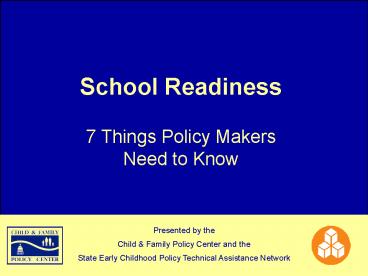School Readiness - PowerPoint PPT Presentation
1 / 17
Title:
School Readiness
Description:
Quality early care and education (child care), family and medical leave ... development. Phonemic. awareness. Ability to work. with others. Good physical ... – PowerPoint PPT presentation
Number of Views:270
Avg rating:3.0/5.0
Title: School Readiness
1
School Readiness
7 Things Policy MakersNeed to Know
Presented by the Child Family Policy Center
and the State Early Childhood Policy Technical
Assistance Network
2
1. Learning Begins at Birth
- Brain growth most rapid
- Child makes connection to worldthe foundation
for all later learning
3
Brain Growth and Child Age
Source RAND Corporation
4
2. Nurture (as well as Nature) Matters
- Competent and confident parenting
- Basic health and nutrition
- Age-appropriate guidance and instruction
- Constant, stable, appropriate supervision
5
Parenting Needs and Public Programs That Address
Them
Need Confident and competent parenting Health
and nutrition Age-appropriate guidance
instruction Constant, appropriate supervision
Public Programs Parenting education, home
visiting, family support Health insurance
coverage, primary and preventive health care,
nutrition services, and special education
services Pre-school, including enriched
pre-school for low-income/disadvantaged
children Quality early care and education (child
care), family and medical leave
6
3. School Readiness Is More Than What Children
Know
Ability to takedirections
Language development
Good physical health
Phonemic awareness
Ability to work with others
7
4. School Unreadiness Is Expensive Society
Pays
- Lifelong health care for chronic conditions
- Special education and grade retention
- Juvenile delinquency and remediation
- Less taxpaying and higher dependency due to
failure in school - Crime and criminal justice system
8
Research Links Public Costs with Failure to Meet
Needs
Parental Abuse/Neglect
Poor- QualitySupervision
PreventableHealth Problems
Inadequate Guidance
Child Health Costs Child Education Costs Child
Human Service Costs Costs in Adulthood
X
X
X
X
X
X
X
X
X
X
X
X
X
X
X
X
9
5. Parents Work
- Dramatic changes in the workforce over the
past 30 years have contributed to economic growth
nationally. Now, the majority of mothers with
young children work simply to earn enough to get
by.
10
Three Decades of Increase
Source U.S. Census
11
6. Quality Matters
Research shows quality is critical to significant
benefits in
- Health and nutrition services
- Home visiting, parenting education, and family
support programs - Child care and pre-school
12
Status of Quality in Child Care
Source Midwestern Child Care Study
13
7. Investments Pay Off
Studies show high rates of return for early
childhood investments that are
- High quality
- Comprehensive
- Aimed at those with the most to gain
14
Returns on Investment in Four Programs
For Every Dollar Spent
15
Public Spending Priorities Do Not Match Research
Findings
Source RAND Corporation
16
Invest in the very young.
Policy Implications
- James HeckmanNobel laureate economist
17
Child Family Policy Center State Early
Childhood Policy Technical Assistance Network

